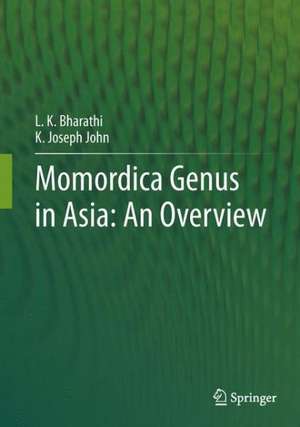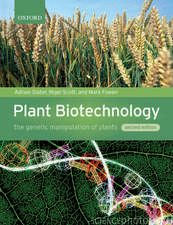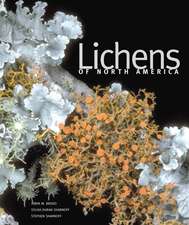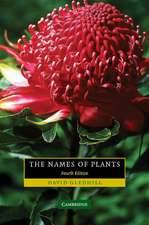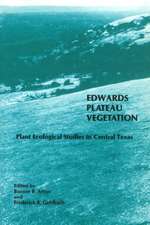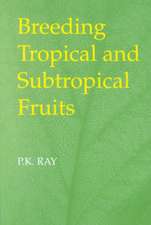Momordica genus in Asia - An Overview
Autor L.K. Bharathi, K Joseph Johnen Limba Engleză Hardback – 4 apr 2013
| Toate formatele și edițiile | Preț | Express |
|---|---|---|
| Paperback (1) | 551.57 lei 38-44 zile | |
| Springer India – 23 aug 2016 | 551.57 lei 38-44 zile | |
| Hardback (1) | 646.62 lei 6-8 săpt. | |
| Springer India – 4 apr 2013 | 646.62 lei 6-8 săpt. |
Preț: 646.62 lei
Preț vechi: 760.73 lei
-15% Nou
Puncte Express: 970
Preț estimativ în valută:
123.74€ • 128.46$ • 103.18£
123.74€ • 128.46$ • 103.18£
Carte tipărită la comandă
Livrare economică 22 martie-05 aprilie
Preluare comenzi: 021 569.72.76
Specificații
ISBN-13: 9788132210313
ISBN-10: 813221031X
Pagini: 168
Ilustrații: XVII, 147 p.
Dimensiuni: 178 x 254 x 15 mm
Greutate: 0.59 kg
Ediția:2013
Editura: Springer India
Colecția Springer
Locul publicării:New Delhi, India
ISBN-10: 813221031X
Pagini: 168
Ilustrații: XVII, 147 p.
Dimensiuni: 178 x 254 x 15 mm
Greutate: 0.59 kg
Ediția:2013
Editura: Springer India
Colecția Springer
Locul publicării:New Delhi, India
Public țintă
ResearchCuprins
1.Introduction.- 2.Description and Crop production.- 3.Origin, Domestication and Distribution.- 4.Taxonomy and Biosystematics.-5.Ethnobotany and Nutritive value.- 6.Cytogenetics and Genetics.-7.Genetic Resources, Germplasm Characterization/Evaluation and Maintenance.- 8.Crop Improvement.
Notă biografică
Dr. L.K. Bharathi, Scientist, Central Horticultural Experiment Station, Bhubaneswar He was born on 20/03/1974 and is presently working as a Scientist at Central Horticultural Experiment Station, a regional research station of Indian Institute of Horticultural Research, Bengaluru. He did his B.Sc. and M.Sc. Degrees from Tamil Nadu Agricultural University, Coimbatore and Ph.D. from Indian Agricultural Research Institute, New Delhi. He joined in Agricultural Research Service as a Scientist at Central Agricultural Research Institute, Port Blair, in 1999 and has more than 13 years of experience in vegetable crop improvement especially in Momordica species. He has published more than 20 research papers in Indian and international journals of repute. Presently, he is engaged in the improvement of Momordica species through interspecific hybridization.
Dr. Joseph John K, Senior Scientist, NBPGR RS, Thrissur He was born on 20/03/1960 and is presently working as a Senior Scientist at the Thrissur Regional Station of the National Bureau of Plant Genetic Resources (NBPGR), New Delhi, the nodal agency for PGR management in India. He did his B.Sc. and M.Sc. degrees from the University of Kerala and Ph.D. from Mahatma Gandhi University, Kottayam. He joined ICAR service as ARS Scientist at VPKAS, Almora in 1986 and has over 26 years of experience in plant genetic resources management of tropical vegetables and tree fruits. He did his Ph.D. on “Ecogeography and genetic diversity of the genus Momordica L in India”. Under this work, the genus Momordica was revised for India; a new species endemic to Western Ghats was described and validly published; status of Assam kakrol was elucidated and ethnobotany of the genus in Western Ghats was documented, besides devising of descriptors and taxonomic key for dioecious and monoecius taxa and preparing ecogeographic conspectus for Momordica. He has carried out over 25 plant exploration and collection missions in Western Ghats, Andaman& Nicobar Islands, Lakshadweep and North Eastern states of India for cucurbits and other vegetables. He has published over 30 research papers in national/international journals. Presently, he is engaged in the Biosystematics of Indian entities of Cucumis and Abelmoschus.
Dr. Joseph John K, Senior Scientist, NBPGR RS, Thrissur He was born on 20/03/1960 and is presently working as a Senior Scientist at the Thrissur Regional Station of the National Bureau of Plant Genetic Resources (NBPGR), New Delhi, the nodal agency for PGR management in India. He did his B.Sc. and M.Sc. degrees from the University of Kerala and Ph.D. from Mahatma Gandhi University, Kottayam. He joined ICAR service as ARS Scientist at VPKAS, Almora in 1986 and has over 26 years of experience in plant genetic resources management of tropical vegetables and tree fruits. He did his Ph.D. on “Ecogeography and genetic diversity of the genus Momordica L in India”. Under this work, the genus Momordica was revised for India; a new species endemic to Western Ghats was described and validly published; status of Assam kakrol was elucidated and ethnobotany of the genus in Western Ghats was documented, besides devising of descriptors and taxonomic key for dioecious and monoecius taxa and preparing ecogeographic conspectus for Momordica. He has carried out over 25 plant exploration and collection missions in Western Ghats, Andaman& Nicobar Islands, Lakshadweep and North Eastern states of India for cucurbits and other vegetables. He has published over 30 research papers in national/international journals. Presently, he is engaged in the Biosystematics of Indian entities of Cucumis and Abelmoschus.
Textul de pe ultima copertă
Asiatic Momordica comprises 10 species of which 3 are monoecious and rest dioecious. They are unique in the sense that all are wild or cultivated vegetables with medicinal uses. Barring bitter gourd, all are under utilized vegetables with little research and conservation efforts. In this book, the authors have presented the available information on various aspects of Asiatic Momordica like taxonomy, cytogenetics, crop improvement, origin, ethnobotany and crop production at one place.
The book is well illustrated with color maps and photographs depicting habit, morphology and distribution of individual taxa. Species distribution map for all Indian taxa, descriptor for characterization and preliminary evaluation of dioecious and monoecious group available varieties, keys for botanical identification are some of the unique features of the book. The book will be useful to botanists, horticulturists, foresters, environment educators, conservation biologists, plant science students in general and all interested in agrobiodiversity.
The book is well illustrated with color maps and photographs depicting habit, morphology and distribution of individual taxa. Species distribution map for all Indian taxa, descriptor for characterization and preliminary evaluation of dioecious and monoecious group available varieties, keys for botanical identification are some of the unique features of the book. The book will be useful to botanists, horticulturists, foresters, environment educators, conservation biologists, plant science students in general and all interested in agrobiodiversity.
Caracteristici
Distribution maps of Momordica spp. are prepared based on the revision of the genus, corrected herbarium specimen, and field studies These maps would enhance the knowledge base and provide improved access to the exact sites Species are identified and described based on extensive field and laboratory research on crossability, morphology, and DNA analysis The most recent genetic resources and breeding techniques are described in the book Includes supplementary material: sn.pub/extras
